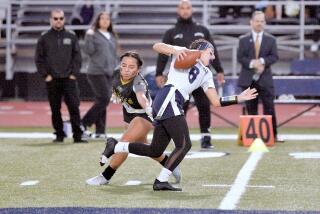Southland Offers Places to Bout
- Share via
Fencing is highly organized in the United States. The United States Fencing Assn. (USFA) organizes and conducts competition at all levels, from local to national, and sends teams to the Olympics.
In the greater Los Angeles area there are more than 300 competitive fencers, with many more recreational ones. Nationwide, there are 100,000 fencers, including active members of USFA, collegiate fencers, plus many who participate in what Ted Katzoff, master-at-arms and founder of Salle Gascon, calls “hidden programs,” such as those at small community centers.
“Mostly it’s small clubs and groups of individuals and instructors who are working very hard and struggling to keep fencing alive and have it grow,” said Katzoff.
Many fencing clubs use salle in their name to mean club, from the French word for hall or large room. The members of fencing clubs bout (fence) together, may take lessons from the leader and represent their club in tournaments.
Three different weapons are used; and each has its own style, target area and scoring methods.
The foil is a thrusting weapon used to hit any part of the opponent’s torso. An epee is a heavier dueling weapon, and any part of the body is legal target. Both foil and epee bouts are scored electronically at tournaments.
Sabers are slashing and cutting weapons. With a saber, the target area is anywhere above the waist. Historically, those who fought with sabers on horseback did not want to hurt the horse--the victor of the duel won the horse. All the rules of fencing have a similar logical basis.
Tournaments take place nearly every Sunday for different events, mostly at Valley College. Fencing is in season September to June, with the high point of competition in March. Audiences are quite small. Though the sport is exciting, it takes some knowledge to enjoy watching. “I’ve had friends come and watch and after it’s over they ask me, ‘Did you win or did you lose?’ ” said Edwin Francis of Newbury Park.
Fencing expenses include the cost of a uniform, padding, face mask and weapons. In competition, blades occasionally break and need to be replaced. Locally, private 20-to-30-minute lessons range from $5 to $10, with an average of $7.
The following sources can provide further information about fencing:
United States Fencing Assn. (USFA). Frank Widder, public relations director for the Southern California Division, will provide information about fencing clubs and when and where tournaments are to be held. Call (213) 393-9494 (days) or (213) 827-4213 (evenings).
West Side Fencing Center, 8735 Washington Blvd., Culver City, (213) 204-BOUT. Hours are Monday through Thursday, 6 to 10 p.m.; Friday, 7 to 9 p.m.; Saturday, 10 a.m. to 4 p.m.
The only facility of its type in the country, this volunteer-run, nonprofit educational institution is equipped for fencing and has a library of fencing materials. Fencers from numerous clubs meet and bout here. The public is invited to come in for a courtesy introduction to the sport and an up-to-date fencing club directory. Floor fee of $3 per visit to fence or $20 per month. Lessons available.
Valley College Community Services. Women’s Gym, Burbank and Coldwater Canyon, Van Nuys, (818) 988-3911. Carl Oberg, (818) 893-9181, is in charge of the fencing program. Fencing takes place Tuesdays 8:30 to 11 p.m. There is a $2 floor fee. Lessons are available for $22 per month. Masks and weapons are provided. Free day classes are also available at Valley College for registered students.
Salle Grenadier, under the leadership of Robert Randolph, meets at Valley College Tuesdays, 8:30 to 10:30 p.m. Call Randolph at (818) 246-9310 (days); or (818) 246-3105 (evenings). Currently, Randolph has a waiting list for private lessons.
Conejo Fencing Club meets at Conejo Community Center in Thousand Oaks, instructed by Duris de Jong, (805) 497-2632. Community Center phone is (805) 495-2163. Classes are held Tuesday and Thursday, 5 to 7 p.m., and Saturday, 10:30 a.m. to 1 p.m. Cost for 10 weeks is $38.
The Learning Tree. George Gadai teaches fencing through the Learning Tree and also gives private lessons. He charges $5 for a 20-minute lesson. His students fence each other after about 10 hours of instruction. His number is (818) 881-0153.
More to Read
Get our high school sports newsletter
Prep Rally is devoted to the SoCal high school sports experience, bringing you scores, stories and a behind-the-scenes look at what makes prep sports so popular.
You may occasionally receive promotional content from the Los Angeles Times.






